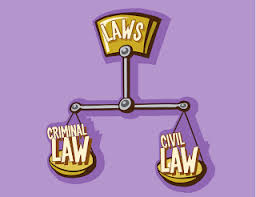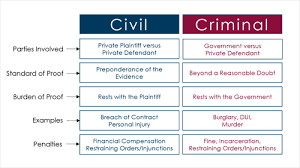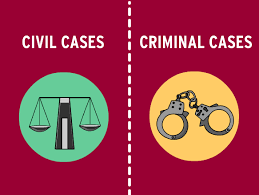
Civil and Criminal law deals with a multitude of matters but are categorised as different types of disputes in NSW and Australia. The differences between civil and criminal law involve elements such as the types of cases, parties involved, purposes and outcomes, standard and burden of proof and court processes. These differences shape both civil and criminal law into unique systems that allow justice to be upheld in different ways.
Civil Law
Civil Law is a vast set of rules that have developed over time and govern and ensure the resolution of disputes between people and/or businesses. The main aim of civil law is essentially to ensure that the aggrieved or affected person/corporation is reinstated in the same position that they were taken away from due to the loss/damage that the defendant has caused. This usually incorporates a form of monetary sum, also known as compensation.
Civil law disputes between individuals are conducted in court in a different way to that of the criminal law. In civil law claims at court, each party gathers, files and serves their evidence. That evidence is then heard before a Magistrate or Judge in court who ultimately determines the legal issues and makes orders in favour or against a party. Legal costs usually then follow for one party to bear the other parties. Similar to criminal law, if any party to the civil dispute is unhappy with the court’s decision, that decision can be appealed to a higher court. The legal costs can be significant for each party. However, the losing party usually ends up being ordered to pay the winning party’s legal costs, which is not what occurs in criminal law.
What about criminal law?
Contrastingly, criminal law involves the State or Commonwealth acting on behalf of the community in prosecuting a person or corporation for committing a crime which the community has chosen to be against the law to the extent of being a criminal offence warranting serious penalties. Criminal law is the oldest type of law and has developed of centuries within Australia. Unlike in some other countries, in Australia, criminal law is divided amongst the state, territory governments on the one side, and the federal government on the other.
Main differences between Civil and Criminal Law

Standard of Proof
One of the most important differences between civil and criminal law in Australia is the standard of proof. The standard of proof is known as the degree to which a party must prove its case to succeed. It describes the amount of evidence necessary to prove an assertion or claim in a trial. The standard of proof must be proven by the party that holds the burden of proof or ‘onus of proof’. The burden and standards of proof differ between civil and criminal matters.
Criminal Law
In criminal law, the burden or obligation of proof of the guilt of the accused is placed squarely on the Crown. In order words, the prosecution hold the burden of proof. This burden is held by the prosecution in respect of every element or essential fact that makes up the offence.
This onus of proof helps uphold one of the key principles in Criminal Law, which is the presumption of innocence. The presumption of innocence encompasses the thought that a person who is charged with a criminal offence is presumed to be innocent unless and until the prosecution’s case has persuaded a jury that the person is guilty beyond reasonable doubt.
Civil Law
Contrastingly, civil proceedings incorporate different burdens and standards of proof to that of criminal matters. In a civil case, generally speaking, the person who brings the action upon the court is said to bear the “onus of proof”. Therefore, if you are the person who introduces the case (the plaintiff), it is up to you to introduce evidence that supports your case. If you are unable to do this, the case may be lost.
The standard of proof in a civil case is also different to that in a criminal matter. The standard of proof in civil law is known as the “balance of probabilities”. This standard of proof may be met if you can successfully establish that the claim that you are making is more probable than not.
Therefore it is evident that there are major differences between the civil/criminal law standard and onus of proof.
Parties to Proceedings
There are major differences between the types of parties that take place in criminal and civil proceedings.
In criminal matters, the parties that are involved are known as the defendant and the prosecution. The defendant is the person accused of the offence in the matter whereas the prosecution is the body that is accusing the defendant of committing the crime.
Speak to a lawyer today
In civil matters, the parties differ to that of a criminal case. Civil law disputes involve a plaintiff and a defendant or respondent and usually involves people and/or corporations resolving disputes involving money. The plaintiff is the person who lodges the claim against the other party. This party is looking to regain something that may have been lost by them unlawfully. The defendant or respondent is the party who the claim is lodged against and they are required to comply with a set of obligations in the way that they behave and conduct the civil claim.
Right to Silence
Civil and Criminal cases entitle the parties involved differing rights. The right to silence is a major aspect of law. It is defined as a legal principle which guarantees any individual the right to refuse to answer questions from law enforcement or court officials.
In criminal law, an accused has the right to silence. They generally do not have to speak to police or the courts. The right to silence reflects the principle that it is the prosecution which the burden of proof in a criminal matter; that it is not up to the accused to prove him or herself not guilty. As well as in police interviews, a defendant in a criminal matter cannot be called to give evidence by the prosecution.
A defendant may give evidence if he or she choses to do so. If a defendant does not chose to give evidence in a criminal proceeding, the judge may comment on this but it must not be suggested that the failure to give evidence was because the defendant is guilty.
Contrastingly, Civil Law does not provide parties with a right to silence. The main difference is that in Civil law if a party decides not to give evidence in the case, this can be used against the party in court.
Types of Cases
Criminal and Civil matters differ heavily when considering the types of cases undertook in each category.
Criminal Cases include acts or omissions such as assault, murder, fraud, sexual assault, traffic incidents such as drink driving, drug supply as well as white collar and corporate crime.
Whereas civil law includes cases such as claims of negligence and torts, breaches of contract and breaches of civil rights.
Purposes of Civil and Criminal law
The purposes of each type of law can be different.
Criminal law has a main purpose of intending to punish, deter or reform the accused offender. There a multiple ways where the courts and police can achieve this purpose of law such as imprisonment and fines. Reforming offenders should and in some cases is a main part in ensuring that there is a reduction of crime in the future.
By Contrast, the purpose of civil law is to remedy disputes between private persons and corporations. There is usually no jail time associated with these matters. The way the civil courts remedy these disputes is through orders of compensation.

What is Criminal Law in Australia?
Criminal law in Australia is concerned with criminal justice and the punishment of offenders.
A significant part of it deals with human and civil rights. Some examples of this include the right to silence, the right to privacy, the right to be able to peacefully and freely walk in public without unlawful interference and the right to liberty.
Offences are usually divided into summary offences (less serious offences), which can be decided by a magistrate at a local court, and indictable offences (more serious crimes), which are decided by a judge, or judge and jury in the District or Supreme Courts.
Usually, in order to decide that a crime has been committed the court has to decide that the person committed an act (‘actus reus’) and intended to commit the act knowing it was wrong (‘mens rea’). However, for some crimes (such as naming a child involved in criminal proceedings) that are ‘strict liability’ crimes, there is no requirement that the person intended to do the act.
The legislation
Commonwealth criminal offences and criminal law are mainly set out in the Crimes NSW state criminal laws are mainly found in the Crimes Act 1900 (NSW), Drug Misuse and Trafficking Act 1985, Bail Act 2013, Uniform Evidence Act 1995 and Law Enforcement (Powers and Responsibilities) Act 2002 and the Criminal Code Act 1995 (Cth).
Importantly, if there is a conflict between state law and federal law, the federal law overrides state law. This is based on section of the Constitution.
Criminal law deals with the regulation of conduct that the government, on behalf of society, considers is against the interests of the community. Because of this, criminal cases always involve the Crown (government) bringing the case to a court to be decided. This is called ‘prosecuting’ the case. Criminal cases are dealt with in courts, rather than in tribunals.
A good criminal lawyer with experience will carefully analyse and assess the prosecution’s evidence to determine its credibility while also determining if the evidence has been illegally or improperly obtained by police, and whether it’s enough to prove the prosecution’s case beyond reasonable doubt.
What is Civil Law in Australia?
Civil law involves disputes and the resolution of disputes between people and/or corporations. It usually involves some form of a monetary compensation from one party to another.
The procedure for civil law is different to that of the criminal law. In civil law, each party must set out their claims and then file and serve evidence they rely on. Subject to evidentiary arguments, that evidence will then be presented to a Magistrate or Judge in court.
Civil law is about the relationship between participants in society, so civil law cases are disputes between participants about something to do with their dealings with each other. A person or organisation who believes that another person or organisation has acted in breach of civil law in their dealings can bring a civil claim to court, this is often referred to as ‘suing for damages’, for example, for a personal injury. A person or organisation that makes a civil law claim is called the ‘plaintiff’. The person or organisation against whom they make the claim is called the ‘respondent’.
Once a decision has been made, the presiding judicial officer will make orders in favour or against a party. Legal costs usually then follow for one party to bear the other parties. Often, legal costs will be significant for the losing party, as they will generally be ordered to pay the winning party’s legal costs.
If a party is unhappy with the court’s decision, they can file an appeal to a higher court.
Civil law deals with legal issues between people and/or organisations that affect people in everyday life.
Some examples of civil law include unpaid debts, fines, discrimination, damages, negligence, divorce, property and child custody disputes between parents.
Civil claim disputes are heard either in tribunals or courts, where an independent judicial officer will preside to hear evidence from both sides before making a determination.
There is clearly differences, but are there any similarities?
Although there are many differences between the two types of law. There is also many similarities. These similarities include.
Each party is entitled to be legally represented
In Australia, every party to a legal dispute has the right to be legally represented. A lawyer will always be able to represent an accused person or entity. Legal Aid plays a major role in this by ensuring that people don’t miss out on legal representation due to reasons such as lack of financial means.
Common Law is used in both areas
Common law is incorporated and used within both criminal and civil law.
Rules within the court
The rules of etiquette within the court room remain the same in both civil law and criminal. It doesn’t matter whether it is criminal prosecution or civil law cases around torts and negligence law or it is a case in the supreme court, the rules that must be followed remain the same.
Acting against these rules can result in criminal charges that would involve someone needing a criminal defence lawyer to fight the criminal case that will ensue.
Open to the public
Both criminal law cases and civil cases and their subsequent proceedings are allowed to be viewed by the general public, not just the state or federal government. Only a non-publication order can prohibit this. There are many legal arguments for and against the benefits of this aspect of criminal and civil law.
In a nutshell...


 (02) 8806 0866
(02) 8806 0866





